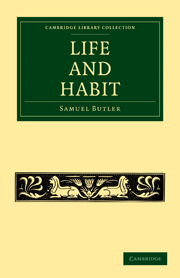Book contents
- Frontmatter
- PREFACE
- Contents
- CHAP. I ON CERTAIN ACQUIRED HABITS
- CHAP. II CONSCIOUS AND UNCONSCIOUS KNOWERS—THE LAW AND GRACE
- CHAP. III APPLICATION OF FOREGOING CHAPTERS TO CERTAIN HABITS ACQUIRED AFTER BIRTH WHICH ARE COMMONLY CONSIDERED INSTINCTIVE
- CHAP. IV APPLICATION OF THE FOREGOING PRINCIPLES TO ACTIONS AND HABITS ACQUIRED BEFORE BIRTH
- CHAP. V PERSONAL IDENTITY
- CHAP. VI PERSONAL IDENTITY—(continued)
- CHAP. VII OUR SUBORDINATE PERSONALITIES
- CHAP. VIII APPLICATION OF THE FOREGOING CHAPTERS — THE ASSIMILATION OF OUTSIDE MATTER
- CHAP. IX ON THE ABEYANCE OF MEMORY
- CHAP. X WHAT WE SHOULD EXPECT TO FIND IF DIFFERENTIATIONS OF STRUCTURE AND INSTINCT ARE MAINLY DUE TO MEMORY
- CHAP. XI INSTINCT AS INHERITED MEMORY
- CHAP. XII INSTINCTS OF NEUTER INSECTS
- CHAP. XIII LAMARCK AND MR. DARWIN
- CHAP. XIV MR. MIVART AND MR. DARWIN
- CHAP. XV CONCLUDING REMARKS
CHAP. IV - APPLICATION OF THE FOREGOING PRINCIPLES TO ACTIONS AND HABITS ACQUIRED BEFORE BIRTH
Published online by Cambridge University Press: 29 August 2010
- Frontmatter
- PREFACE
- Contents
- CHAP. I ON CERTAIN ACQUIRED HABITS
- CHAP. II CONSCIOUS AND UNCONSCIOUS KNOWERS—THE LAW AND GRACE
- CHAP. III APPLICATION OF FOREGOING CHAPTERS TO CERTAIN HABITS ACQUIRED AFTER BIRTH WHICH ARE COMMONLY CONSIDERED INSTINCTIVE
- CHAP. IV APPLICATION OF THE FOREGOING PRINCIPLES TO ACTIONS AND HABITS ACQUIRED BEFORE BIRTH
- CHAP. V PERSONAL IDENTITY
- CHAP. VI PERSONAL IDENTITY—(continued)
- CHAP. VII OUR SUBORDINATE PERSONALITIES
- CHAP. VIII APPLICATION OF THE FOREGOING CHAPTERS — THE ASSIMILATION OF OUTSIDE MATTER
- CHAP. IX ON THE ABEYANCE OF MEMORY
- CHAP. X WHAT WE SHOULD EXPECT TO FIND IF DIFFERENTIATIONS OF STRUCTURE AND INSTINCT ARE MAINLY DUE TO MEMORY
- CHAP. XI INSTINCT AS INHERITED MEMORY
- CHAP. XII INSTINCTS OF NEUTER INSECTS
- CHAP. XIII LAMARCK AND MR. DARWIN
- CHAP. XIV MR. MIVART AND MR. DARWIN
- CHAP. XV CONCLUDING REMARKS
Summary
But if we once admit the principle that consciousness and volition have a tendency to vanish as soon as practice has rendered any habit exceedingly familiar, so that the mere presence of an elaborate but unconscious performance shall carry with it a presumption of infinite practice, we shall find it impossible to draw the line at those actions which we see acquired after birth, no matter at how early a period. The whole history and development of the embryo in all its stages forces itself on our consideration. Birth has been made too much of. It is a salient feature in the history of the individual, but not more salient than a hundred others, and far less so than the commencement of his existence as a single cell uniting in itself elements derived from both parents, or perhaps than any point in his whole existence as an embryo. For many years after we are born we are still very incomplete. We cease to oxygenise our blood vicariously as soon as we are born, but we still derive our sustenance from our mothers. Birth is but the beginning of doubt, the first hankering after scepticism, the dreaming of a dawn of trouble, the end of certainty and of settled convictions.
- Type
- Chapter
- Information
- Life and Habit , pp. 59 - 77Publisher: Cambridge University PressPrint publication year: 2009First published in: 1878

